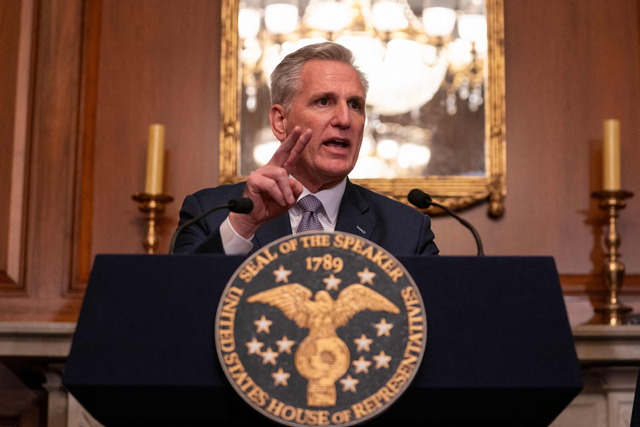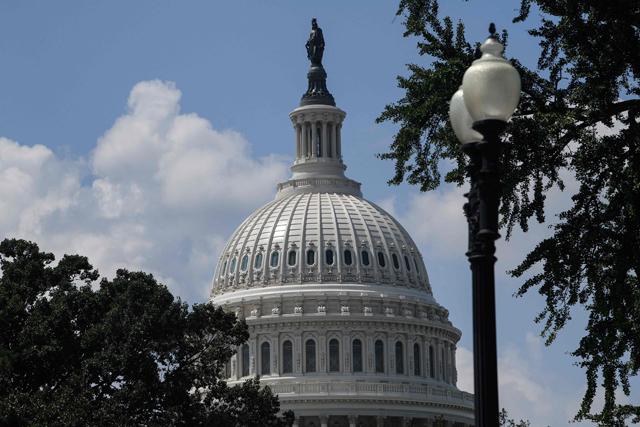You are here
Biden signs funding bill, averting government shutdown
By AFP - Mar 23,2024 - Last updated at Mar 23,2024

US President Joe Biden greets Lieutenant Colonel Tribhuwan Singh and Command Sergeant Major Pablo Cortez as he arrives at Delaware Air National Guard Base in New Castle, Delaware, on Friday (AFP photo)
WASHINGTON — US President Joe Biden on Saturday signed into law a long-awaited funding bill passed by Congress, keeping federal agencies running through September and averting a damaging partial government shutdown.
“The bipartisan funding bill I just signed keeps the government open, invests in the American people, and strengthens our economy and national security,” Biden said in a statement.
Senators missed a midnight deadline to pass the $1.2 trillion package to keep the lights on in several key government agencies but voted in the early hours to pass a resolution that had already advanced from the House.
At the same time, Biden called on lawmakers to approve additional national and border security funding.
“Congress’s work isn’t finished. The House must pass the bipartisan national security supplemental to advance our national security interests,” Biden’s statement said. “And Congress must pass the bipartisan border security agreement — the toughest and fairest reforms in decades.”
“It’s time to get this done.”
‘Our persistence has been worth it’
A day of high-stakes Capitol Hill drama began at midday Friday, when the House of Representatives passed a $1.2 trillion, six-bill package representing the largest and most contentious section of federal funding.
With cash running out at midnight for three-quarters of the government, including defence and homeland security, the Senate was thrust into a race against the clock to advance the legislation to Biden’s desk.
Budget negotiations looked close to breaking down, with both sides pushing to tweak the legislation to reflect their campaign messaging and priorities ahead of November’s presidential election, when Biden faces former president Donald Trump.
Senators were preparing to adjourn with no deal on holding a vote, which would have prompted the White House Office of Management and Budget to begin scaling back operations in key federal agencies on Saturday morning.
But a deal came together just as the midnight deadline arrived, and the Senate voted to pass the resolution after 2:00 am local time (6:00 GMT) in Washington.
“It wasn’t easy, but tonight our persistence has been worth it,” Democratic Majority Leader Chuck Schumer said on the Senate floor after hours of tense negotiation.
“It is good for the American people that we have reached a bipartisan agreement to finish the job,” he added before the bill received final approval.
Republican Senator Mitt Romney said while the bill was “far from perfect, I voted for this appropriations bill because it provides critical funding for our military and for border security”.
Speaker under pressure
Hours earlier, Republican House Speaker Mike Johnson had angered his own right flank by relying on Democratic votes to advance the package to the Senate.
Marjorie Taylor Greene, a close ally of Trump, told reporters she had filed a “motion to vacate” the speaker’s chair over Johnson’s endorsement of the funding package, thrashed out over weeks of tense negotiations between the parties.
The resolution, a rare maneuver that requires a simple majority to pass, comes after the same maneuver led to the removal of previous speaker Kevin McCarthy last fall — and weeks of infighting as Republicans rejected several potential replacements before settling on Johnson.
The timeline for next steps on Greene’s resolution was not immediately clear, although a vote to remove Johnson cannot take place until April at the earliest, with the House now on a two-week recess.
Greene told CNN that “quite a few” Republicans were supporting her effort.
The shutdown would have affected about 70 per cent of government agencies and departments, as funding for the first 30 per cent — covering agriculture, science, veterans programs, transport and housing — passed without major drama last month.
Five of the six bills covering the rest of federal spending were also straightforward, but disputes over the funding of homeland security delayed the release of the deal, originally expected last weekend.
Republican hard-liners were angered by a lack of stricter border security provisions in the package, as well as the overall price tag and the elevated speed with which the deal has been negotiated.
Related Articles
WASHINGTON — US senators voted last week to green-light a government funding package that keeps open several key departments threatened with
WASHINGTON — The US Congress passed an 11th-hour funding bill on Saturday to keep federal agencies running for another 45 days and avert a c
WASHINGTON — US lawmakers will dive into the busiest legislative period in years in the coming week, with President Joe Biden counting on a
















